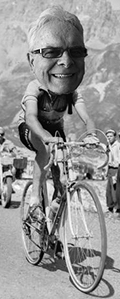A summary of the two Tour de France races
 Mon, August 1, 2022
Mon, August 1, 2022 I missed posting here last week for the first time in a long time. The reason, I got wrapped up in the Tour de France. First the men’s race, one of the best I had seen in recent years. Followed by the women’s race.
In the men’s race it was good to see that Tadej Pogacar was indeed human, and could be beat, although I can’t help feeling that Jonas Vengegaard was not greatly superior to Pohacar, rather equal, but having a stronger team.
Anyway, it was refreshing to see the respect these two young riders had for each other and it brought me back to what the sport used to be, as I remember it years ago.
I didn’t know what to expect in the Tour de France Femmes, but from the first stage on, I was hooked. Shorter stages meant that tactically the race played out quicker and was extremely entertaining and exciting to watch.
In the flat sprinter’s stages for example, there was none of the holding the break at two or three minutes for the entire race, until the last 10 kilometers.
Because the stages were shorter, breaks were brought back quickly, often followed by more attempts to break clear. This fast, attacking style of racing, over a shorter distance was not only exiting to watch, but it also meant by the end of the stage the peloton had split into smaller groups.
The result being, only the strongest riders contested the sprint, instead of the chaotic entire field, bunch sprint that has become all too common on the flat stages of the men’s races.
As for the final two mountain stages, Annemiek van Vleuten just dominated the entire race, winning both stages and the Overall Classification. It was a joy to watch her climbing ability.
It was great to see the support of fans by the roadside, especially as they had been exposed to three weeks of the men’s race. Apparently, the TV coverage was also watched by more viewers world-wide.
I can only imagine that having a Women’s Tour de France, will create an increased interest in the sport, by people who would otherwise not usually watch.
This can only be a good thing for the sport in general and perhaps create a way forward from the somewhat tarnished image that unfortunately the sport has created for itself over the years.


















The Vuelta never disappoints
Of the three Grand Tours, I often feel that the Vuelta a Espana is the most entertaining. Coming off one of the best Tour de France events in recent years, I wondered if this was likely this year, but after just over a week of racing, I have to say, “Possibly.”
What makes any sporting event entertaining and exiting is the unknown, the unexpected outcome. Prior to this year’s TDF I thought Tadej Podacar was unbeatable, but he proved to be human after all. Or it could be argued that the strongest team won, not necessarily the strongest individual.
The Vuelta always has the unknown element because it is such a tough race, with more climbing than the other Grand Tours. This year has the added unknown of so many new riders entering the sport at young ages, (In their early twenties.) previously unheard of.
Looking at the start list before the race, I was struck by the number of new names, most I had not previously heard of. One notable exception to this was Remco Evenepoel. So much has been written about this 22-year-old Belgian rider during the last year, along with the speculation that he is the new Eddy Merckx.
I can’t help but feel what a tremendous and unnecessary burden this is to place on such a young athlete, but sadly this is what the press and media do. They build people up only to knock them down again when they fail.
Cycle racing has to be one of the toughest sports out there, both physically and mentally. The constant steam of new-comers to the sport keeps it fresh and interesting, but entering the sport, especially Grand Tours, at such a young age I expect to see shorter careers than we have seen in the past.
What are your views?